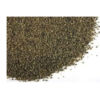Description
It is a very high source of vitamins and minerals.
It is a great salt substitute or can be added to any salt grinder to ensure you are getting essential minerals.
Kelp consists of 76 percent carbohydrates, 14 percent protein and 10 percent fat. Kelp contains, per weight, more fibre than even brown rice — 6.2 grams of fibre per 100 grams of wet weight — without high levels of starchy carbohydrates.
Kelp contains notable amounts of:
- iron
- manganese
- calcium
- magnesium
- copper
- zinc
- riboflavin
- niacin
- thiamine
- vitamins A, B-12, B-6, and C
The benefits of these vitamins and nutrients are substantial. B vitamins in particular are essential for cellular metabolism and providing your body with energy.
Kelp is not a complete protein source; it does not contain significant amounts of all nine essential amino acids.
Kelp contains significant levels of tryptophan, threonine, isoleucine, methionine, cysteine and valine. Kelp also contains lower levels of leucine, lysine, phenylalanine, tyrosine and histidine.



